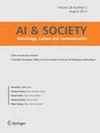Mind who’s testing: Turing tests and the post-colonial imposition of their implicit conceptions of intelligence
IF 2.9
Q2 COMPUTER SCIENCE, ARTIFICIAL INTELLIGENCE
引用次数: 0
Abstract
Abstract This paper aims to show that dominant conceptions of intelligence used in artificial intelligence (AI) are biased by normative assumptions that originate from the Global North, making it questionable if AI can be uncritically applied elsewhere without risking serious harm to vulnerable people. After the introduction in Sect. 1 we shortly present the history of IQ testing in Sect. 2, focusing on its multiple discriminatory biases. To determine how these biases came into existence, we define intelligence ontologically and underline its constructed and culturally variable character. Turning to AI, specifically the Turing Test (TT), in Sect. 3, we critically examine its underlying intelligence conceptions. The test has been of central influence in AI research and remains an important point of orientation. We argue that both the test itself and how it is used in practice risk promoting a limited conception of intelligence which solely originated in the Global North. Hence, this conception should be critically assessed in relation to the different global contexts in which AI technologies are and will be used. In Sect. 4, we highlight how unequal power relations in AI research are a real threat, rather than just philosophical sophistry while considering the history of IQ testing and the TT’s practical biases. In the last section, we examine the limits of our account and identify fields for further investigation. Tracing colonial continuities in AI intelligence research, this paper points to a more diverse and historically aware approach to the design, development, and use of AI.注意谁在测试:图灵测试和后殖民时期对智力的隐性概念的强加
本文旨在表明,人工智能(AI)中使用的主流智能概念受到来自全球北方的规范性假设的偏见,这使得人工智能是否可以不加批判地应用于其他地方而不会对弱势群体造成严重伤害成为问题。在第1节的介绍之后,我们将在第2节简要介绍智商测试的历史,重点关注其多重歧视性偏见。为了确定这些偏见是如何形成的,我们从本体论上定义了智力,并强调了智力的构建和文化变化特征。转向人工智能,特别是图灵测试(TT),在第3节中,我们批判性地检查其潜在的智能概念。该测试在人工智能研究中具有核心影响,并且仍然是一个重要的方向。我们认为,无论是测试本身,还是在实践中如何使用它,都有可能促进一种仅仅起源于全球北方的有限的智力概念。因此,应该根据人工智能技术正在使用和将要使用的不同全球背景,对这一概念进行批判性评估。在第4节中,我们强调了人工智能研究中的不平等权力关系是一个真正的威胁,而不仅仅是哲学上的诡辩,同时考虑到智商测试的历史和TT的实际偏见。在最后一节中,我们检查了我们的帐户的限制,并确定了进一步调查的领域。本文追溯了人工智能研究中的殖民连续性,指出了一种更加多样化和历史意识的方法来设计、开发和使用人工智能。
本文章由计算机程序翻译,如有差异,请以英文原文为准。
求助全文
约1分钟内获得全文
求助全文
来源期刊

AI & Society
COMPUTER SCIENCE, ARTIFICIAL INTELLIGENCE-
CiteScore
8.00
自引率
20.00%
发文量
257
期刊介绍:
AI & Society: Knowledge, Culture and Communication, is an International Journal publishing refereed scholarly articles, position papers, debates, short communications, and reviews of books and other publications. Established in 1987, the Journal focuses on societal issues including the design, use, management, and policy of information, communications and new media technologies, with a particular emphasis on cultural, social, cognitive, economic, ethical, and philosophical implications.
AI & Society has a broad scope and is strongly interdisciplinary. We welcome contributions and participation from researchers and practitioners in a variety of fields including information technologies, humanities, social sciences, arts and sciences. This includes broader societal and cultural impacts, for example on governance, security, sustainability, identity, inclusion, working life, corporate and community welfare, and well-being of people. Co-authored articles from diverse disciplines are encouraged.
AI & Society seeks to promote an understanding of the potential, transformative impacts and critical consequences of pervasive technology for societies. Technological innovations, including new sciences such as biotech, nanotech and neuroscience, offer a great potential for societies, but also pose existential risk. Rooted in the human-centred tradition of science and technology, the Journal acts as a catalyst, promoter and facilitator of engagement with diversity of voices and over-the-horizon issues of arts, science, technology and society.
AI & Society expects that, in keeping with the ethos of the journal, submissions should provide a substantial and explicit argument on the societal dimension of research, particularly the benefits, impacts and implications for society. This may include factors such as trust, biases, privacy, reliability, responsibility, and competence of AI systems. Such arguments should be validated by critical comment on current research in this area. Curmudgeon Corner will retain its opinionated ethos.
The journal is in three parts: a) full length scholarly articles; b) strategic ideas, critical reviews and reflections; c) Student Forum is for emerging researchers and new voices to communicate their ongoing research to the wider academic community, mentored by the Journal Advisory Board; Book Reviews and News; Curmudgeon Corner for the opinionated.
Papers in the Original Section may include original papers, which are underpinned by theoretical, methodological, conceptual or philosophical foundations. The Open Forum Section may include strategic ideas, critical reviews and potential implications for society of current research. Network Research Section papers make substantial contributions to theoretical and methodological foundations within societal domains. These will be multi-authored papers that include a summary of the contribution of each author to the paper. Original, Open Forum and Network papers are peer reviewed. The Student Forum Section may include theoretical, methodological, and application orientations of ongoing research including case studies, as well as, contextual action research experiences. Papers in this section are normally single-authored and are also formally reviewed. Curmudgeon Corner is a short opinionated column on trends in technology, arts, science and society, commenting emphatically on issues of concern to the research community and wider society. Normal word length: Original and Network Articles 10k, Open Forum 8k, Student Forum 6k, Curmudgeon 1k. The exception to the co-author limit of Original and Open Forum (4), Network (10), Student (3) and Curmudgeon (2) articles will be considered for their special contributions.
Please do not send your submissions by email but use the "Submit manuscript" button.
NOTE TO AUTHORS: The Journal expects its authors to include, in their submissions:
a) An acknowledgement of the pre-accept/pre-publication versions of their manuscripts on non-commercial and academic sites.
b) Images: obtain permissions from the copyright holder/original sources.
c) Formal permission from their ethics committees when conducting studies with people.
 求助内容:
求助内容: 应助结果提醒方式:
应助结果提醒方式:


